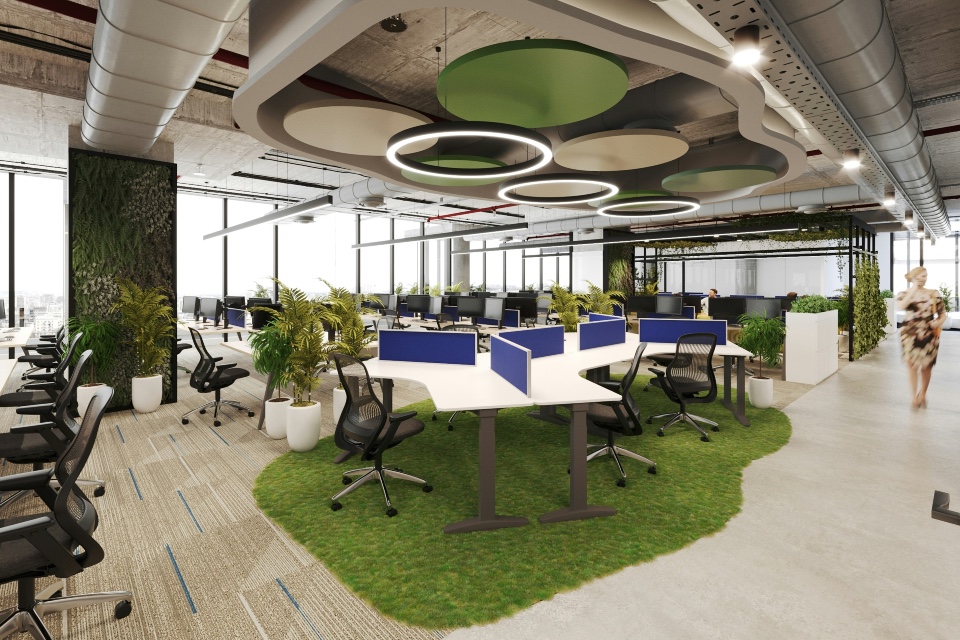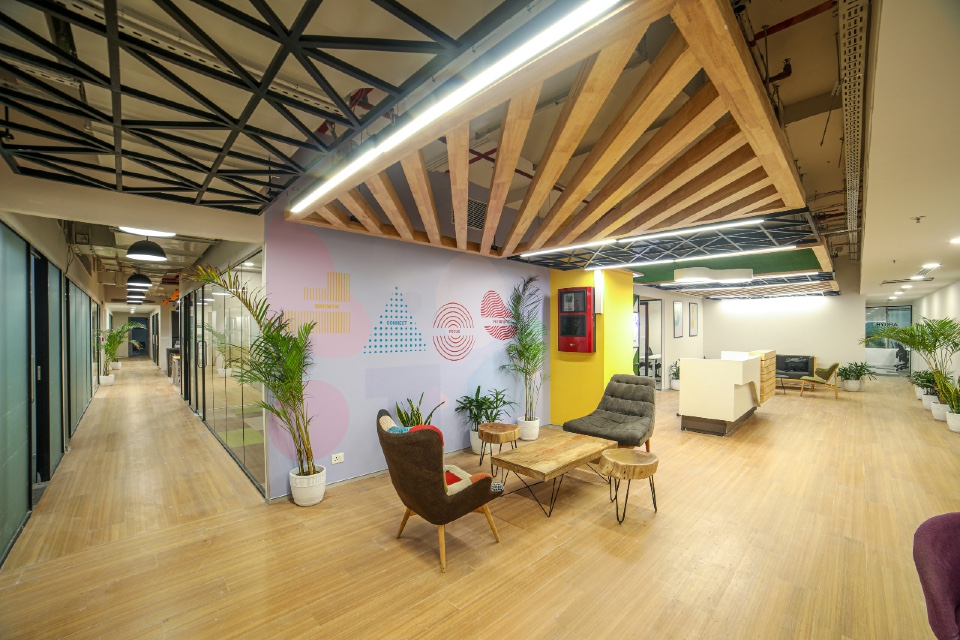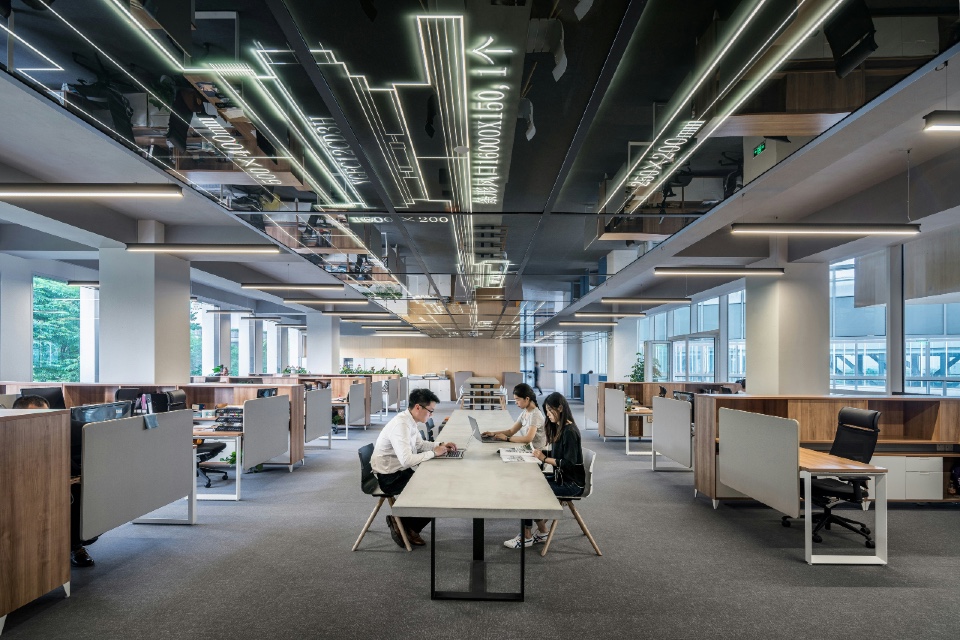Tired of waiting for your office to get a facelift? The office of the future is beginning to take shape, fuelled by new technological advancements aimed at maximising efficiency, and the growing prioritisation of employee wellness.
With integration of new technology such as extended reality (XR) and new Internet of Things (IoT) applications, tomorrow’s office facilitates sustainable working practices and promises to take hybrid working to the next level.
Anglo Scottish Asset Finance, which works closely with offices around the UK to level up their facilities, quizzed artificial intelligence (AI) model ChatGPT about some of the most exciting tech advancements coming to your office in the future. Another AI model, Midjourney, then imagined what these new innovations might look like…
Designing for wellness
In the hybrid working future, office design will take place with the team’s wellness in mind. Gone are the days of dingy, chilly offices that employees dread attending – tomorrow’s offices are built to promote healthy habits. Sick building syndrome (where the office team begins experiencing illness symptoms as a result of being in poor working conditions) is expected to be a thing of the past.
Expect to see plenty of natural light – which increases productivity and improves attitude – with adjustable desks so workers can adopt comfortable working positions.
Dedicated wellness spaces such as meditation rooms, yoga or exercise spaces are expected to become more commonplace, as employers strive to make offices a “destination rather than an obligation.”
Sustainability comes first
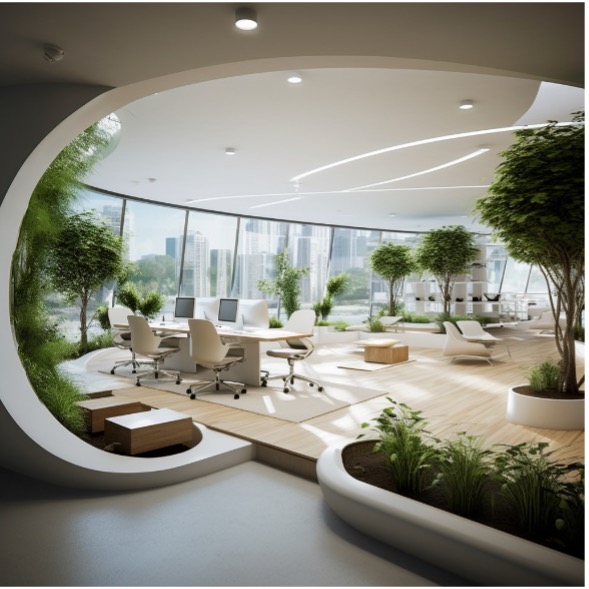
As we move towards the UK’s net zero targets and beyond, sustainability is more important than ever when it comes to your office’s design. The future office is futureproof, using recycled and sustainably sourced building materials throughout to minimise environmental impact.
For the next few years at least, with sustainability top of the agenda, you’re more likely to see bamboo being used throughout an office’s design than sci-fi style sliding doors. However, travel forward a few more years and more futuristic interior designs could be front and centre!
Sustainable office builds are not only great for the planet and the building’s occupants, but it’s also a great selling point for the business of the future, given that 67% of job applicants are more likely to apply to work for an environmentally responsible company.
Extended reality (XR)
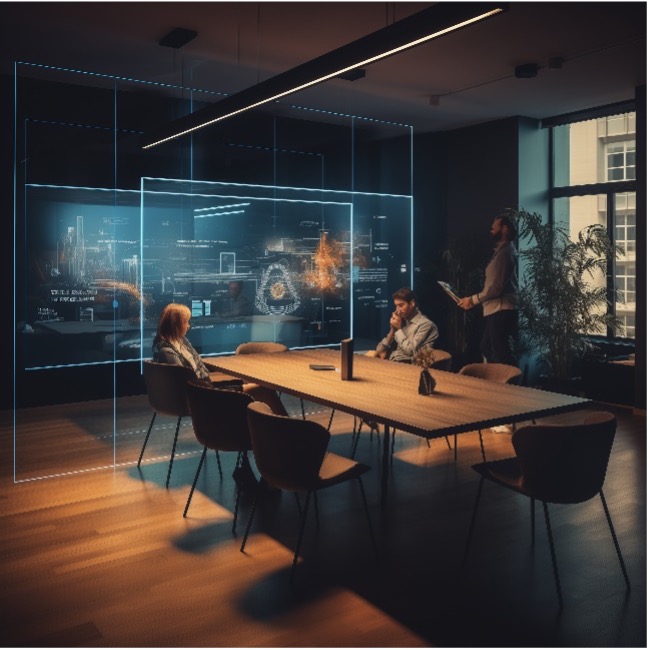
In recent years, office-based employees have been enjoying more autonomy than ever, thanks to hybrid working arrangements offering increased flexibility. However, that flexibility has often been accompanied by technological issues, like poor connectivity for Zoom meetings. In the office of the future, technological improvements mean that hybrid working will be simpler, more efficient and more immersive than ever.
According to AI, staff who are working from home in the future will be able to use augmented reality (AR) and virtual reality (VR) tech in order to seamlessly combine virtual and in-person collaboration. The future office is optimised for hybrid working setups, and could simulate attendance for those working at home – so you can avoid any awkward Zoom delays.
Smart integration
As smart homes continue to take precedence in the residential world, it’s little surprise that offices will follow suit. The office of the future will have plenty of Internet of Things (IoT) integrations for a number of different applications.
Smart heating and ventilation controls will be used to improve employee comfort, monitoring temperature, humidity levels and lighting brightness to provide optimal working conditions. Like with a smart home, every aspect of the future office can be controlled centrally via a
For building managers, the value lies in cost savings – motion-sensing LED lighting could save up to 70% on energy expenditure, while real-time diagnostics for the building’s other facilities can reduce downtime and enable greater efficiency.
Brain-computer interfaces
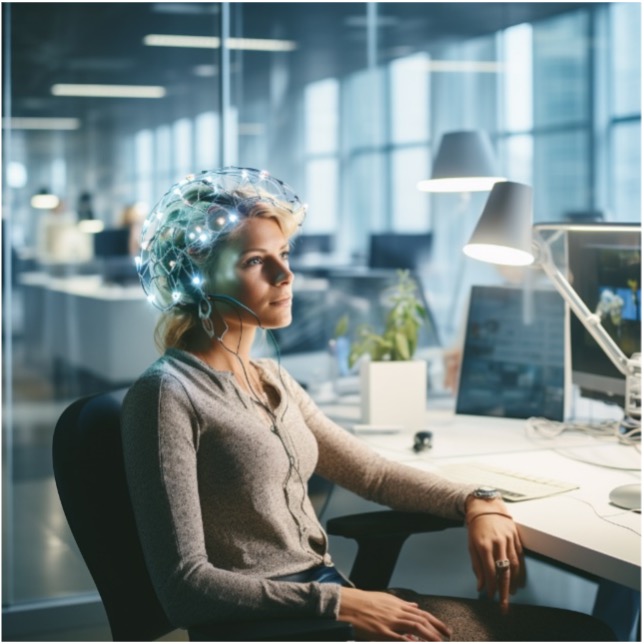
According to AI, the future office may even be able to integrate brain-computer interfaces (BCIs) to analyse brain signals and interact with office technology. BCIs are currently being used to research, augment or repair cognitive or motor-sensory functions. For the most part, that means the ability to directly control robotic limbs or send signals to a computer via the brain.
In the office of the future, seamless integration of this technology is used to make colleagues’ lives easier. Think typing without actually typing, or using a “passthought” instead of a password. You’d also have the ability to control and deliver presentations by just thinking about moving through the slides.
This technology might be closer than you think – Toronto startup Muse has created a sensing headband that provides minute-by-minute updates about what’s going on in your brain. Brain data can mean improved efficiency and workplace safety, but there are understandable concerns about how invasive this technology is. I mean, who wants their boss to see what you’re thinking all the time?!
Wellbeing tech
Wearable tech is increasingly being deployed across a range of sectors to monitor employees’ wellbeing and safety. Wearables are currently being used in warehousing and logistics to ensure employees are lifting heavy items properly and adhering to safety protocols, but in the office of the future, they have a range of new applications.
Workplace wearables will take aim at improving employee wellbeing – they’ll measure the quality of your sleep and offer sleep tips to increase productivity. They’ll also be able to monitor your posture and sitting position to ensure that you aren’t doing damage to your body in the long-term.
As we move further into the future, advancements in AI will see complete integration with your wearable tech, giving you your very own assistant on your wrist.
From the sublime to the ridiculous…

There are plenty of exciting office innovations that we can expect to see in offices around the world in the not-too-distant future. Looking a little further forward, however, the AI model quizzed by Anglo Scottish believes that offices in 50 years’ time may be able to offer perks such as space travel and teleportation.
“With advancements in space travel, some companies may be able to offer space tourism experiences as a unique perk for employees.” Office-based teleportation could also be offered, with opportunities to instantly be transported to far-off or exotic locations. Sounds decent, right?
Well, don’t hold out too much hope. Perhaps one day space travel might be accessible enough for it to be offered as a work perk. But that day is likely a long way away.
Carl Johnson, Head of Asset Finance at Anglo Scottish, comments: “There are plenty of exciting technological advances promising to elevate workplace practices around the world – these innovations are designed to support revolutionary new ways of working and transform the way your office operates. Some might be sooner than you think – so keep an eye out!”
Photo by Bethany Legg on Unsplash





